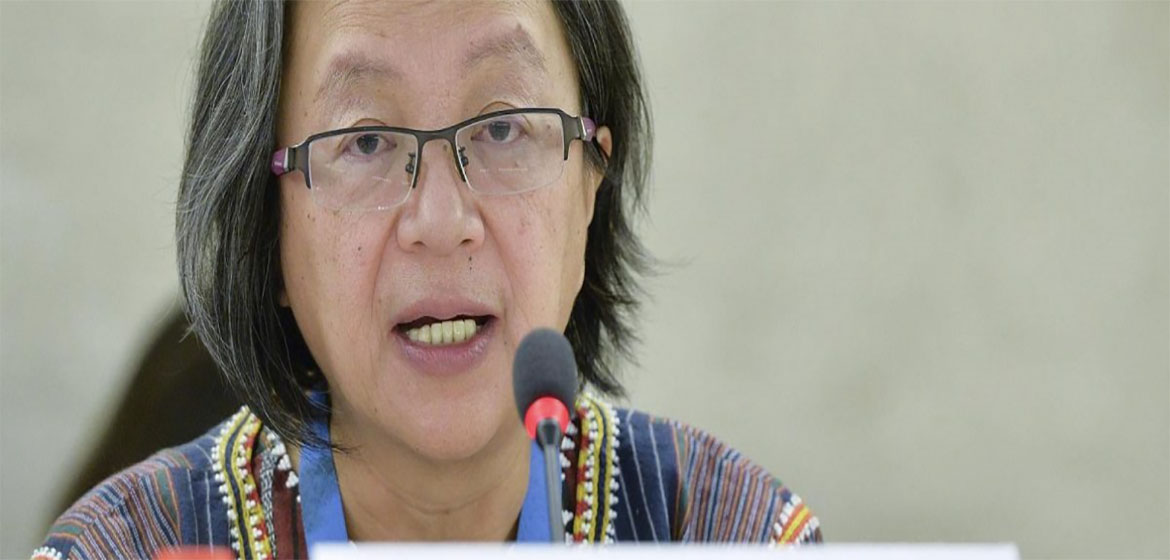by Philip Jacobson
- Victoria Tauli-Corpuz is one of the most prominent figures in the global movement for indigenous rights.
- This month, Philippine President Rodrigo Duterte’s administration included her name on a list of suspected terrorists, along with a number of other environmental and human rights defenders.
- The Philippines is already the most dangerous country in Asia in which to be an environmental defender, with 41 murders recorded last year. Tauli-Corpuz fears it may be getting worse.
After Victoria Tauli-Corpuz, the United Nations special rapporteur on indigenous rights, was included on a list of some 600 people the government of her native Philippines wants declared as terrorists, her colleagues the move as “retaliation” for her speaking out against recent attacks on indigenous Lumad communities on the country’s main southern island of Mindanao.
“I agree with that totally,” Tauli-Corpuz told Mongabay in a phone interview on March 16, citing a series of vitriolic remarks aimed at U.N. rapporteurs by the administration of Philippine President Rodrigo Duterte since last December, when she the displacement and killings of Lumads in Mindanao. The region has been under a state of martial law since Islamist militants took over the city of Marawi there in May. (The U.N. special rapporteur on extrajudicial killings, Agnes Callamard, has also Duterte by criticizing the deaths linked to his war on drugs.)
Tauli-Corpuz is the highest-profile name on a petition filed in court this month by the Philippine justice ministry accusing hundreds of people, many of whom are indigenous leaders and environmental activists, of being communist guerrillas associated with the New People’s Army, the armed wing of the Communist Party of the Philippines. Tauli-Corpuz insists she has no connection with either group.
A Kankana-ey-Igorot woman from the mountainous Cordillera region in the northern Philippines, Tauli-Corpuz has become one of the most prominent figures in the global movement for the recognition of indigenous rights. She worked for years as a community organizer on her home island of Luzon, and helped lead the successful push to get the U.N. General Assembly to adopt the Declaration on the Rights of Indigenous Peoples in 2007.
Tauli-Corpuz also chaired the , a federation of indigenous peoples’ organizations, in the early 1990s. The list of alleged terrorists, meanwhile, includes a handful of former CPA officials. One of them is Joan Carling, who is now co-convener of the Indigenous Peoples Majors Group for Sustainable Development, which coordinates indigenous participation in international forums. Carling is also an expert member of the U.N. Permanent Forum on Indigenous Issues.
“I have fought for human rights and, in particular, the rights of indigenous peoples my entire life,” Carling said in a statement posted to Facebook, adding, “I therefore denounce this unfounded and false accusation, which not only poses a risk to my security, but is also an affront to the exercise of the fundamental rights and freedoms associated with democratic governance, and to the human rights obligations of the Philippine government.”
“I call on the international community to show solidarity and express their concern to the Philippine Government,” Carling added.

Anyone designated a terrorist in the Philippines can be subject to government monitoring of their movements and communications. The state can freeze their bank accounts.
The petition comes at a time when President Duterte is overseeing a in which thousands of alleged dealers and users have been slain by police and vigilantes since he took office in 2016.
Carlos H. Conde, Philippines researcher for Human Rights Watch, the petition a “virtual government hit list.” “There’s a long history in the Philippines of the state security forces and pro-government militias assassinating people labeled as [New People’s Army] members or supporters,” he said.
AMAN, the main indigenous rights organization in neighboring Indonesia, accused Duterte of “criminalizing” indigenous leaders. AMAN it was “deeply disturbed to see how the Philippines, once an inspiration to indigenous organizations throughout the world … has descended into being a virtual police state, where any individual or organization who challenges the Executive is accused of terrorism.”
Thousands of Lumads have been forced from their homes during the past two years, said Tauli-Corpuz, whose position at the U.N. her to conduct fact-finding missions in countries where indigenous rights are under threat.
While this is partly to do with the ongoing military crackdown on the insurgency in Mindanao, the violence is also the result of conflict between indigenous communities and companies eyeing their ancestral lands, especially for mining and, increasingly, oil palm plantations. The government has announced to add 10,000 square kilometers (3,860 square miles) of oil palm, an area larger than Puerto Rico, almost all of it in Mindanao.
“They send the paramilitary groups, who are also sometimes members of those communities, and then they tell them to get out of those communities,” Tauli-Corpuz said. “Maybe the idea is to get them out so there will be no people supporting the guerrillas. I guess that’s their thinking. But how can you displace people who have been in their territory since time immemorial?”
Tauli-Corpuz said she was “constantly trying to raise this issue with the government so that they will be able to do something about it. We are also of course talking to some of the politicians who speak out against these kinds of atrocities.”
“It’s not just displacements, it’s also killings,” she said. “Recently there have been several indigenous people and also leaders who have been assassinated.”
The Philippines is already the second most dangerous country in the world, after Brazil, in which to be an environmental defender, according to Global Witness. Forty-one activists were slain in the Southeast Asian country in 2017, the NGO .
Tauli-Corpuz fears the climate may be worsening under Duterte.
“It’s very dangerous now for anyone who wants to protect the environment or defend their lands, because of these kinds of extrajudicial means of going against people who are resisting and protesting.”
Source:
Related to SDG 10: Reduced inequalities



